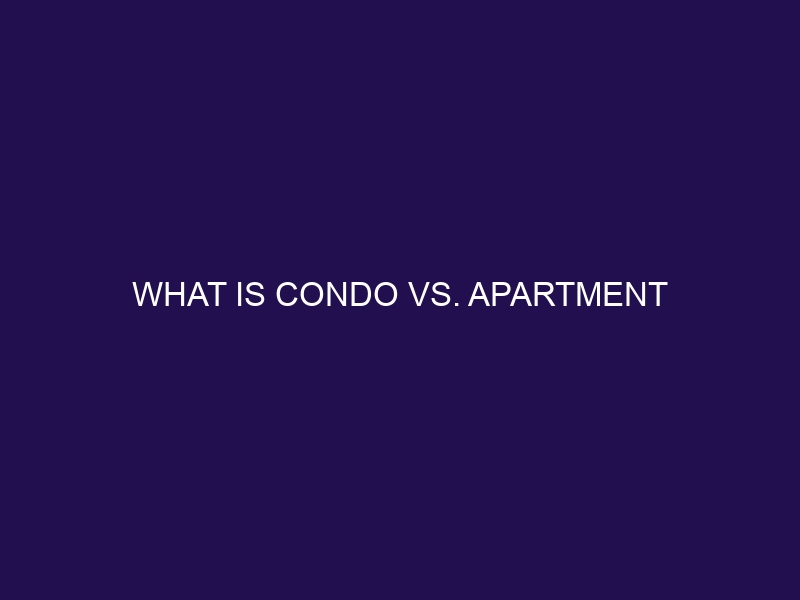What is Condo vs. Apartment
Condos and apartments are two common types of residential properties, but they differ in ownership structure, amenities, and other factors. Understanding the distinctions between the two can help you make an informed decision when choosing your next living space.
An apartment, typically found in multi-unit buildings, is a rental property where tenants lease living spaces from a landlord. Apartments have specific features and characteristics, such as defined lease terms, shared amenities, and limited customization options. The landlord is responsible for maintenance, repairs, and property management.
Conversely, a condominium, or condo, is a privately-owned unit within a larger complex or building. Condo owners have more control over their living space and can personalize it according to their preferences. They also have access to shared amenities, but they are responsible for their unit’s maintenance and any applicable homeowners association (HOA) fees.
The key differences between condos and apartments lie in ownership structure, financial considerations, maintenance responsibilities, and privacy factors. Condo ownership offers a sense of ownership and potential investment opportunities, while apartment living provides flexibility and limited financial commitment.
Choosing between a condo and an apartment depends on various factors, including your lifestyle, financial situation, and personal preferences. Consider factors such as long-term goals, budget, desired level of responsibility, and the need for privacy when making your decision.
By understanding these differences, you can determine which type of housing suits your needs and ultimately find the right living space for you.
What is an Apartment?
Looking to understand the ins and outs of apartments? Look no further! In this section, we’ll dive into the essence of what makes an apartment unique. From the definition of an apartment to the various ownership structures and amenities, we’ve got you covered. Whether you’re a renter or looking to own, we’ll explore the pros and cons of both options. Get ready to gain a comprehensive understanding of apartments that will leave you informed and ready to make the best decision for your living situation!
Definition of an Apartment
The definition of an apartment is a type of housing that is typically rented rather than owned. It is a self-contained unit within a larger building or complex, which is divided into multiple units. Apartments are designed to provide living spaces for individuals or families and typically offer amenities such as a kitchen, bathroom, and living area. The ownership of the apartment building lies with the landlord or property management company, who is responsible for maintaining the property and collecting rent from tenants. The definition of an apartment may vary depending on local laws and regulations.
Ownership Structure and Landlord
The ownership structure and landlord are both key factors to consider when distinguishing between condos and apartments. In the case of apartments, they are usually owned by a single entity or landlord, who then rents out individual units to tenants. This means that the landlord takes on the responsibility of property upkeep and addressing any maintenance issues that may arise.
On the other hand, condos are a different story. Condos consist of individually owned units within a larger complex. In this scenario, each condo owner has a personal stake in the property and shares the ownership responsibilities through a homeowners association (HOA). The HOA is in charge of managing the common areas and enforcing the rules and regulations set forth.
To make the right decision between a condo and an apartment, it is crucial to have a firm grasp of the ownership structure and landlord involvement. Understanding how these elements come into play will help you determine which option suits your needs best.
Amenities and Facilities
Amenities and facilities are vital factors to consider when deciding between a condo and an apartment. Here are some key considerations:
- Apartment: Apartments typically provide essential amenities such as laundry facilities and parking. Some larger apartment complexes may also feature fitness centers, swimming pools, and communal spaces.
- Condo: Condos often offer a broader range of amenities. These can include gyms, rooftop gardens, concierge services, and security systems. Moreover, condos may provide more private facilities like individual balconies or terraces.
By taking into account your preferences and lifestyle, choose the type of property that offers amenities and facilities that align with your needs and improve your living experience.
Renting vs. Owning
Renting vs. Owning is a crucial aspect to ponder upon when making a choice between a condo and an apartment.
- When it comes to Renting, apartments are usually preferred as they offer flexibility and lesser responsibility for maintenance and repairs.
- On the other hand, Owning a condo is often considered as it provides more control and the opportunity to build equity. Owners are accountable for maintenance and potentially higher costs such as mortgage payments and association fees.
Factors to take into consideration include financial stability, long-term plans, and lifestyle preferences. Renting might be a preferable option for those seeking flexibility and minimal responsibility, while owning is more suitable for individuals looking to build equity and have greater control over their living space. Ultimately, the decision relies on personal circumstances and goals.
What is a Condo?
Condos: the epitome of modern urban living, but what exactly defines a condo? In this section, we unravel the essence of condos by exploring their distinctive features and attributes. From the unique ownership structure and the role of homeowners associations to the enticing array of amenities and facilities they offer, we’ll dive into the elements that set condos apart. And if you’re curious about the purchasing process and the cost considerations involved, we’ve got you covered. Get ready to uncover the allure of condos in all their glory!
Definition of a Condo
A condo, short for condominium, is a type of housing where individuals own their individual units within a larger building or complex. It is defined as a privately owned residence within a building or community where certain areas, such as hallways, elevators, and amenities, are shared collectively by all residents. The ownership structure of a condo typically includes a homeowners association (HOA), which is responsible for managing and maintaining common spaces and enforcing community rules. Condos offer amenities and facilities such as swimming pools, fitness centers, and parking areas. When considering a condo, it is important to understand the financial considerations and responsibilities that come with ownership.
The concept of condominiums, also referred to as condos, can be traced back to ancient civilizations such as Ancient Rome, where individuals would own apartments within larger buildings. This form of ownership later evolved in Europe during the Middle Ages and gained popularity in North America during the 20th century. Condos provide a balance between the benefits of ownership and the convenience of shared amenities, making them a popular housing choice for many.
Ownership Structure and Homeowners Association
The ownership structure and homeowners association are key aspects to consider when deciding between a condo and an apartment.
In terms of ownership structure, in an apartment, tenants typically rent the space from a landlord who owns the entire building. On the other hand, in a condo, individuals own their units and have shared ownership of common areas through a homeowners association.
Speaking of the homeowners association, condos have a homeowners association (HOA) responsible for managing shared areas, enforcing rules, and collecting fees. While apartments may have a management company, they don’t typically have the same level of resident involvement or decision-making authority as an HOA.
Considering these factors, such as the ownership structure and homeowners association, will help you determine which option is right for you based on your preferences, financial considerations, and desired level of involvement in the community.
Amenities and Facilities
In the decision-making process of choosing between a condo and an apartment, amenities and facilities hold great importance.
| Condo | Apartment |
| Shared amenities like swimming pools, fitness centers, and communal areas. | Limited amenities, depending on the apartment complex. Some may offer basic facilities like a laundry room. |
| May include additional luxurious features such as concierge services and private parking. | Typically lacks high-end amenities and luxurious extras present in condos. |
| Facilities can be well-maintained due to homeowners association fees and shared responsibilities. | Facilities may vary in terms of maintenance and cleanliness, depending on the management of the apartment complex. |
Purchasing and Cost Considerations
When it comes to purchasing and cost considerations, there are specific factors to keep in mind when deciding between a condo and an apartment.
- Ownership: Condos are usually owned by individuals, while apartments are typically owned by a landlord or property management company.
- Costs: Condos may have additional costs such as monthly maintenance fees and special assessments for repairs or improvements, while apartments may have lower upfront costs and no additional fees.
- Upfront Expenses: When considering purchasing and cost, it is important to note that purchasing a condo often requires a larger down payment and closing costs, whereas renting an apartment usually requires a security deposit and first month’s rent.
- Resale Value: When thinking about purchasing and cost, it should be considered that condos typically have higher resale value potential due to individual ownership and the ability to make improvements, while apartments generally have lower resale value.
- Long-term Costs: Owning a condo may involve ongoing expenses for maintenance and repairs, while renting an apartment shifts the responsibility to the landlord.
Key Differences Between a Condo and an Apartment
Looking to differentiate between condos and apartments? Let’s dive into the key distinctions! From ownership structures to financial considerations, maintenance and responsibility, and even privacy and noise concerns, we’ll explore what sets these two types of residential properties apart. So, whether you’re in the market for a new home or simply curious about the differences, this section will break it down for you without any fluff or jargon!
Ownership Structure
The ownership structure is a significant point of differentiation between a condo and an apartment. To better understand the contrast, refer to the comparison table below:
| Condo | Apartment |
|---|---|
| Owners possess individual ownership of their units | Units are owned by a single entity (usually a corporation) |
| Owners are responsible for paying HOA fees to cover maintenance and shared amenities | Tenants pay rent to the landlord for maintenance and amenities |
| Owners enjoy more control and decision-making power | Tenants have limited control and must comply with landlord rules |
| Owners have the potential to earn a return on investment | Tenants do not have ownership stake or potential for investment |
From a historical perspective, apartments predate condos. Ancient Rome and Greece utilized apartments in large buildings to accommodate multiple families. Conversely, condos emerged in the mid-20th century as a solution to the growing demand for individual ownership in larger structures. Today, understanding the ownership structure is paramount when making a decision between a condo and an apartment.
Financial Considerations
Financial considerations are of utmost importance when deciding between a condo and an apartment. Here are some crucial factors to take into account:
- Price: Apartments generally have more affordable upfront costs, including lower down payments and no additional fees. On the other hand, condos often come with higher purchase prices and extra expenses like maintenance fees.
- Investment potential: Condos can be seen as an investment opportunity, offering the potential for appreciation and rental income. In contrast, apartments are typically not regarded as investment properties.
- Monthly expenses: Condo owners are responsible for paying monthly maintenance fees, while apartment renters only need to cover their rent. It is important to consider that these fees can vary significantly and should be included in the overall budget.
- Resale value: Due to their potential investment benefits, condos tend to have higher resale value. In contrast, the resale value of apartments is primarily influenced by the real estate market.
When contemplating the financial aspects, it is vital to evaluate personal financial goals, such as long-term investment strategies and budget limitations, in order to make an informed decision between a condo and an apartment.
Fun Fact: The first condominiums were developed in New York City in the early 20th century as a response to the growing demand for private homeownership in urban areas. This innovative form of property ownership revolutionized the real estate industry and has since become a popular housing option worldwide.
Maintenance and Responsibility
When discussing maintenance and responsibility, it is important to note the key differences between condos and apartments:
- For condos, the owners are responsible for the maintenance and repairs within their unit. This includes tasks such as plumbing, electrical work, and handling appliances. However, the homeowners association (HOA) typically assumes responsibility for taking care of the common areas and the exterior of the building.
- On the other hand, apartments operate differently. Tenants do not have to concern themselves with major maintenance tasks as landlords or property management companies handle the repairs. Additionally, the landlord is responsible for the upkeep of the common areas.
Understanding these differences is crucial as it allows you to make an informed decision based on your preferences and your personal willingness to take on maintenance responsibilities.
Privacy and Noise
When it comes to choosing between a condo and an apartment, the level of privacy and noise in a living space is a crucial factor to consider. Both privacy and noise play a significant role in determining your ideal living situation.
- Privacy: In comparison, condos generally offer more privacy since they consist of individually owned units. These units often have separate entrances and fewer shared spaces, providing a greater sense of privacy.
- Noise: On the other hand, apartments might have more noise due to shared walls and common areas. However, it’s worth noting that condos can also have noise issues. Nevertheless, by selecting units with soundproofing measures, you can effectively minimize noise disturbances.
- Community Living: Another factor to consider is the sense of community living. Apartments often have a more communal atmosphere, with neighbors living in close proximity. Conversely, condos may have a stronger sense of community due to the availability of shared amenities and common spaces.
- Security: Both condos and apartments prioritize the security of their residents. They may offer features like gated access or surveillance cameras to enhance privacy and safety.
- Personalization: When it comes to personalization and customization of living spaces, condos generally provide more flexibility. This ability to personalize and customize contributes to a sense of privacy and individuality in your living space.
Which One is Right for You?
Choosing between a condo and an apartment can be a tough decision. It all comes down to finding the right fit for your lifestyle, goals, finances, and personal preferences. In this section, we’ll explore the factors you need to consider when making this decision. From understanding how your lifestyle and goals align with each option to evaluating the financial aspects and taking into account your own personal preferences, we’ll help you navigate this choice with confidence.
Factors to Consider: Lifestyle and Goals
When deciding between a condo and an apartment, it’s important to consider lifestyle and goals factors. Here are some key considerations to keep in mind:
- Location: Consider the proximity to work, schools, and amenities that align with your lifestyle.
- Space: Determine the amount of space you need and whether the layout of a condo or apartment suits your preferences.
- Amenities and Facilities: Assess the amenities and facilities offered by each option, such as gyms, pools, or common areas.
- Maintenance and Responsibilities: Consider whether you prefer the convenience of a managed condominium or the flexibility and lower maintenance responsibilities of an apartment.
- Long-term Goals: Evaluate your long-term plans, such as investment potential or the possibility of renting out your property in the future.
By carefully considering these lifestyle and goal-related factors, you can make an informed decision about whether a condo or apartment is the right choice for you.
Financial Considerations
Considering the financial aspect is crucial when deciding between a condo and an apartment. Below are some key financial considerations to help you make an informed decision:
| Condo | Apartment | |
|---|---|---|
| Ownership Structure | Condos are individually owned units. Owners are responsible for mortgage, property taxes, and HOA fees. | Apartments are generally rented, with tenants paying monthly rent. Ownership lies with the landlord or property management company. |
| Upfront Costs | Condos often require a larger upfront investment, including down payment, closing costs, and potentially higher interest rates. | Renting an apartment typically requires a security deposit, first-month’s rent, and potentially rental application fees. |
| Monthly Expenses | In addition to the mortgage, condo owners pay monthly HOA fees, which cover building maintenance, amenities, and communal areas. | Apartment tenants pay a fixed monthly rent, which may include utilities or require separate payments. |
| Financial Responsibility | Condo owners are responsible for repairs and maintenance within their unit, which can vary in cost. The condo association may also enforce special assessments for major repairs or upgrades. | Apartment renters are generally not responsible for repairs or maintenance expenses, as they are the landlord’s responsibility. |
| Resale Value | Condos may provide the opportunity for appreciation and potential profit upon resale. Market conditions and location affect the return on investment. | Renting an apartment does not offer potential equity or resale value, but it provides flexibility and simplicity in housing costs. |
Consider your financial capacity, long-term goals, and lifestyle preferences to determine which option aligns with your financial considerations and overall needs.
Personal Preferences
When deciding between a condo and an apartment, personal preferences play a crucial role. Consider the following factors:
- Layout and space: Determine if a spacious layout or a compact living arrangement suits your personal preferences and lifestyle.
- Amenities and facilities: Take into account the amenities available in each option, such as fitness centers, swimming pools, or common areas, based on your personal preferences.
- Privacy: Evaluate the level of privacy offered in both condominiums and apartments based on factors like shared walls and common areas, taking into consideration your personal preferences.
- Community dynamics: Assess whether a more communal atmosphere or a greater sense of independence aligns better with your personal preferences.
- Maintenance responsibilities: Reflect on your willingness to handle maintenance tasks yourself or if you prefer a management team to handle them, based on your personal preferences.
Ultimately, understanding your personal preferences is crucial in making the right decision between a condo and an apartment.
Frequently Asked Questions
What is the main difference between condos and apartments?
The main difference between condos and apartments is ownership. Condos are privately owned and rented out by individuals, while apartments are owned by property management companies.
What are the differences in rental turnover between condos and apartments?
In condos, the rental turnover process typically involves a one-on-one interaction between the owner and tenant. However, in apartments, the turnover process is managed by the property management company, with standardized guidelines for tenants to follow.
Can you explain the differences in interior customization options between condos and apartments?
Condos offer more flexibility in terms of interior customization and personalized decision-making, as owners have more control over their living spaces. On the other hand, apartments may have limitations on customization due to design standards and regulations set by the property management company.
What are the differences in parking options between condos and apartments?
Condo complexes may offer dedicated parking spaces or assigned parking for residents. Apartments, on the other hand, generally provide onsite parking for tenants.
Who is responsible for addressing structural damage in condos and apartments?
In a condo, the responsibility for addressing structural damage lies with the individual owner of the unit. For apartments, the landlord or property management company is typically responsible for structural repairs.
What are the differences in monthly payments between condos and apartments?
When renting an apartment, the monthly payment usually includes rent and, in some cases, additional fees such as utilities and parking. In condos, besides rent, there may be additional fees like monthly dues to the homeowner’s association for shared amenities and maintenance expenses.







